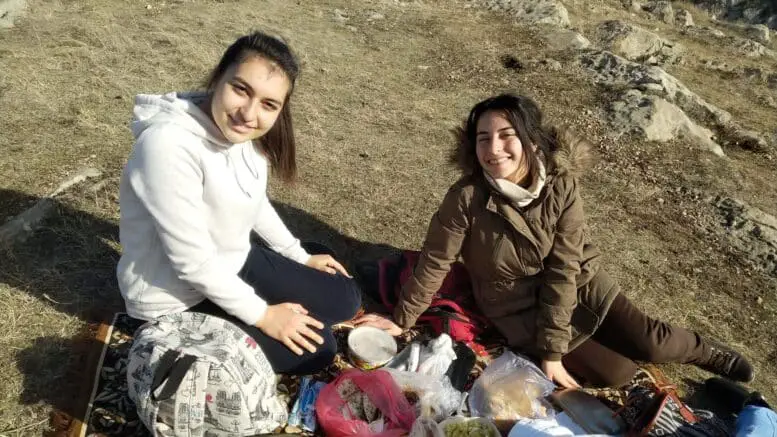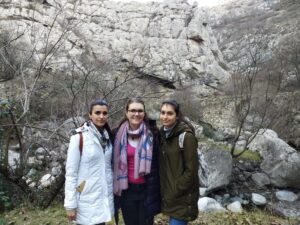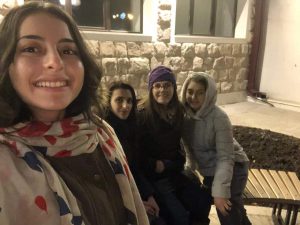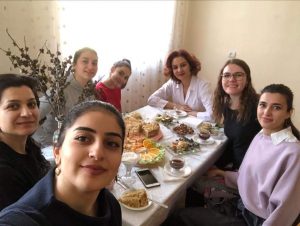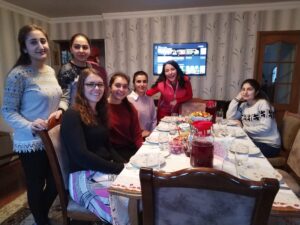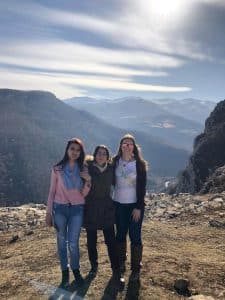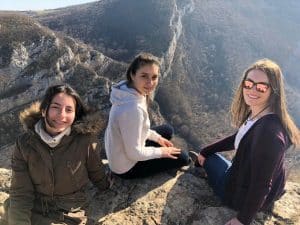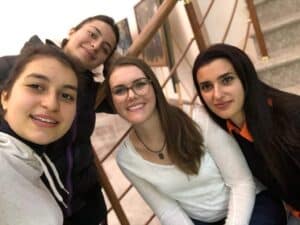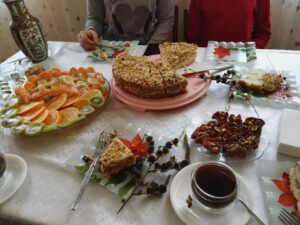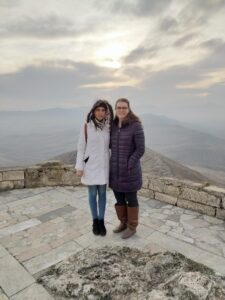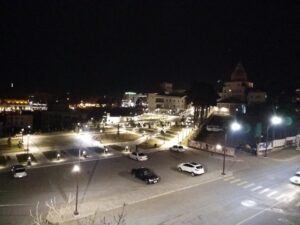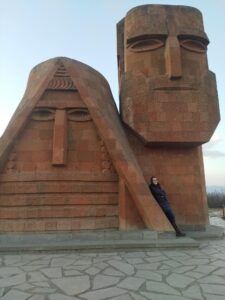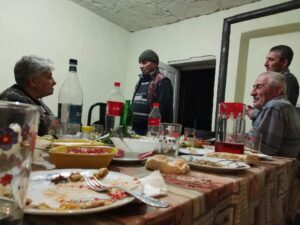The views expressed in this interview do not necessarily reflect those of GeoHistory or SRAS. This fascinating interview is presented here as documentation of what it is like to live in a country that most other countries don’t recognize as existing, as well as what it is like to live in a recent warzone that has not fully transitioned to stable peace. The trauma from this is very well and is expressed openly by the interviewees here, both in how it was received and in how it is expressed. We can only begin to come to peace when we realize fully what each side has gone through.
On a previous trip to Yerevan, Armenia, I made a friend from the Nagorno-Karabakh region – a de-facto country. While internationally recognized as part of Azerbaijan, it has been governed by the independent Republic of Artsakh since 1988. Populated in vast majority by ethnic Armenians, it is protected by Armenian military forces. Upon my recent return to Armenia, I had the opportunity to interview both my friend and a couple other residents of the region on their perspectives about daily life in a country whose borders and government are not recognized and over which a “frozen conflict” is constantly threatening to turn hot again, throwing the region again into wartime strife. My friend Nane is in her mid-thirties. Her friends Maria and Betty who she introduced me to are about 19 and 20 respectively.
As someone from Karabakh, how do you feel that your identity differs from those living in the rest of Armenia?
Nane: I think that the main difference is probably our language. We tend to use a lot more words that are borrowed from Russian in this region. We also have some influence from Azerbaijani and Farsi in our dialect. In addition, people here tend to speak better Russian than in other parts of Armenia, as in more grammatically correct. The second way would be that our people are more reserved and have a harder time expressing emotion. Those in the rest of Armenia have an easier time doing this and are really a lot warmer than we are. But the people of Karabakh are just like our mountains – firm. But although we appear that way on the outside, our hearts are still warm.
Maria: Of course, we are both Armenian, and for that reason we are very similar. But like Nane mentioned, we have our own dialect, meaning that our language is a little bit different. I also consider us to be very hospitable, even more so than those in the rest of Armenia. As Nane also mentioned, our small nation is very isolated. We have neighbors – Turkey, Iran, Azerbaijan, and Georgia – most of whom we are cut off from for political reasons. Although we are closer in proximity to the borders with Azerbaijan and Iran, we only really have access to them through Yerevan, and it is really quite far from Karabakh (approximately six hours). I think that even though we are both Armenians, there are still some differences between us.
Do you think that people don’t like to show their emotions because of the recent war?
Nane: Maybe that’s also why. But I think it’s mostly because we are surrounded by mountains and rarely leave our territory. We are very isolated in a sense, as compared to people living closer to the capital, who may have the opportunity to travel a little bit more than us.
Do you think people feel safe in Karabakh?
Maria: I think our lives here are more comfortable. I think that people living in other parts of Armenia are more susceptible to crime. For instance, here if you lose your phone or you drop some money on the ground, someone will call out to you and make you aware that you lost something. In general, I think it’s just safer here. In that respect, we have less to worry and our lives are more peaceful and carefree.
Nane: We walk safely anywhere at night. There are no dangerous parts of our town, Stepanakert, at all. However, there have been numerous times in Armenia’s history where the people of Karabakh have had to flee from their enemies. For that reason, the mentality that people generally have is to run away whenever they face danger. This trait is still present in many people. Maybe this manifests itself in people being shy or have a personality complex of some sort. They can’t express their feelings very often or in depth. I personally see this as a hindrance. But in Yerevan, people are more open to the rest of the world, and for that reason, people are less fearful, and more open than our people.
Do people in Armenia and Karabakh debate who is more “Armenian”?
Nane: I don’t think that people think, “We are real Armenians” and “No, they are not real Armenians.” Because during the war in 2016, the whole nation was united into one army against the enemy. There was no difference between the Armenians from Karabakh versus those in Yerevan. We were truly united and it was a very beautiful and exciting thing to see. I was also very surprised, because sometimes they say, “you are from Karabakh,” but at that time, it was not obvious, or important really, who is from where.
When you go to Yerevan, how does being from Karabakh affect your interactions with people there? What do they think of you? Do they view you as foreign? Do they treat you more or less kindly?
Nane: It depends on the person. But I must say this, the taxi drivers will always try to rip you off. Just as they interact with any other foreign person, they will try to cheat us. This is because they know that we are unaware of the actual fare. For that reason, we’re very afraid to take taxis there. But our taxis here have also learned from the taxi drivers in Yerevan, because now they try and do the same thing! But not everyone will assume you are from Karabakh. They may think you are just from another distant province in Armenia, because our dialect is similar to other dialects spoken in other parts. For the most part, people treat us kindly. They view us as guests and welcome us. I haven’t been treated rudely in any way.
Maria: I agree. For the most part, people treat you kindly. If you tell them you are from Karabakh, they may say, “I’ve heard of it” or “I’ve been there.” If anything, I think they are just curious to know more about Karabakh and what brings you to Yerevan.
Are there differences in holidays in Karabakh versus the rest of Armenia? Even if all of the same ones exist, are they still celebrated the same way?
Maria: All holidays for us are the same, except we don’t celebrate Vardavar – an ancient, pagan festival where people throw water at each other. Only children in our region celebrate this holiday.
Nane: For us, the only holidays that we celebrate with gusto would be December 31st, or New Year’s Eve, and January 13th – the end of the New Year, also known as the Old New Yeаr (Старый Новый Год). But in Yerevan, they celebrate on both of these days and every day in between, whereas we only celebrate specifically on those two days. These traditions are still left over from the Soviet period.
What do people do for leisure in Karabakh?
Nane: It’s hard to find leisure here. There are no movie theaters. There are only some cafés and some restaurants. That’s all. There are no other places to go for entertainment. That’s why many youths don’t know what to do with their free time. There aren’t many places where they can even go learn something so that they can spend their free time more productively. In fact, sometimes foreigners feel bad for us because they say you just go for walks and then you go back home. You don’t have any other places to go. When they pity us in this way, it makes us a little sad.
How do you feel about this? Does having fewer options make your life more peaceful? Do you instead wish you had more things to do? What is the better alternative?
Nane: I think our lifestyle has both its advantages and disadvantages. Maybe if we had more places to go, we would have less time for more important things, like time with family. On the other hand, however, if you have free time, and you want to spend it productively, such as learning a new skill, there aren’t as many opportunities.
Maria: I have a younger sister and she is fairly busy. She has piano lessons and dance, which takes up a lot of her time, so I don’t think everyone is so unoccupied.
How do you personally like to spend your free time?
Betty: I like to watch TV, read books, sit around on my phone. Sometimes I just like to sit around and do absolutely nothing.
It seems that there are a number of people in Karabakh who want to learn English. What is the motivation behind this?
Maria: I study English as a major at school. I think English is both important and popular to learn all over the world because English is the world’s most widespread language and has become the second official language in many countries. The main language we speak to foreigners is English. I heard a statistic that approximately 90% of the world’s population either speaks or has learned at least some English words, so English plays a huge role on the world scene.
Nane: As an English teacher, I am aware that a lot of people in our town of Stepanakert are interested in learning English, and this isn’t only young people. Some older people are interested in learning it, too. Many people try to learn it and they are motivated to do so. Many people even take their children to private tutors to learn English from the very beginning. So yes, there is an increasing demand for English language instruction in our region. Practically everyone here wants to learn English.
Why do you think the reason for that is? Do many foreigners visit Stepanakert?
Nane: Maybe there is a connection there. Especially in the summer, when we get more tourists, local people may want to communicate with them. Also, people have the personal goal of learning English to better enable them to travel around the world. In general, a lot of people feel that knowing English opens doors for them – for their future, for their careers. Many people truly have a desire to master English.
Why do you personally learn English?
Betty: Because there are a lot of books that are written in English. With English, I can not only read these books, but I can make new friends. And if you know English, you can travel to so many countries.
Maria: Yes. It’s simple if you know a language and you travel, because you can communicate freely with people with minimal confusion. And you don’t necessarily have to be in America or England to use English, because English is spoken everywhere. I just like speaking English. It makes me happy.
Nane: Also, the majority of information on the internet is in English. Therefore, in order to be more informed, mastering English is imperative.
Many view learning English as an instrument to enable to them to go live in another country. What is your take on leaving Karabakh? Are people interested in leaving this region in search of greater opportunities elsewhere, even in Yerevan?
Maria: We are scared of staying in foreign countries long term. Although we have no opportunities here, we don’t want to leave. We recognize that we don’t have a good economy. The way I look at it, every foreign country is a hotel, but we need a home.
You mentioned earlier that people here are more closed off and unable to express emotion. How do you feel that living in a disputed region affects your life?
Nane: In a sense, people have become used to living in an area of conflict because we have no other option. We know that at any time we are vulnerable to another war or some sort of violence. For that reason, there are many people living in constant fear who are unable to live as happy of lives as they want to, because there is always the chance that something could happen and that affects their life in some way or another. It’s very sad. Living in a disputed country, you don’t know what the future holds or what could happen the next day. This causes people a lot of constant anxiety, which can even negatively impact their health. As a result of the chronic stress, some people develop underlying health conditions, such as heart problems and diabetes, both of which are commonplace in our region.
Maria: I honestly don’t view this as a problem. I don’t think we usually have much to worry about. The only time we should worry is when war begins. On average, this doesn’t usually affect our lives. We live as we do, as we’ve always lived before, and as we are living now. When there is no political pressure, we live peacefully. Although these threats do spell out imminent danger, I feel that in Karabakh’s capital, Stepanakert, we are safe. We are further removed from the war fronts.
How do you feel that the war in 2016 affected everyone in Karabakh?
Maria: It shook us up.
Nane: Yes. It was a real shock.
Did some people want to permanently leave Karabakh because of this war?
Maria: Yeah, but I only know of one family who left.
Nane: Yes. Those who had the opportunity to leave and those who were afraid left. For instance, pregnant women, whose husbands weren’t enlisted in the army left. Those with husbands fighting in the war stayed. But, overall, most people stayed because of the amount of people in the region who served in the military during that time.
Do people think there will be another war?
Nane: Another war? The possibility of war is always imminent. We just don’t know when the next one will happen, because the war that we had was quite unexpected. It happened all of a sudden. With that line of reasoning, why can’t we say that another war could, in fact, happen tomorrow?
Did any civilians die during this war?
Nane: Yes. In Martuni, there was a bombing and I know that one schoolchild died from that. Another set of grandparents were broken in on in their home by the soldiers. They were severely mistreated by the Azerbaijani forces. Their ears were cut off. It was very sad, because in war times, Armenians may kill people, but they don’t torture them. This news was even more shocking because it showed a lack of respect for elderly people, which we value in Armenian culture in general. It was the same as in the war during 1992 when Azerbaijanis also did many cruel things to our people. I feel that Armenians, in fact, learned cruelness from them, because previously we didn’t do those sorts of things, even during a war. But, in general, Azerbaijanis did many cruel things to their prisoners of war, including torture and poisoning them with petroleum. They even killed pregnant women after forcing them to have abortions. There are even more cruel cases that I cannot share. When you read eyewitness accounts of what happened during their captivity, you can’t help your tears, your emotions, because of how shocking and sad it is that one human being can treat another human being so terribly. The war should have its limits. Sure, you fight against each other, but you should remember that there are also limits. We are all humans after all.
During the 2016 war, what was your experience? Did you stay in Karabakh? Did you leave? Was it even possible to leave? What do you remember from this time?
Nane: Many wives were at home crying while their husbands were at war. Although we wanted to flee to Yerevan, as many civilians were doing during this time, this was a difficult time for us because my sister was pregnant. My mom and I didn’t want to leave her at home while she waited for her husband to come back from the war, so we stayed. I remember just sitting at home for four days in panic. Everyone was just sitting at home and crying. We were all so afraid. We didn’t know what to with ourselves. Our futures felt very uncertain. We were also afraid that our ears would get cut off, just like those elderly prisoners of war we had heard about in that village. We were afraid of being harmed by the Azerbaijanis. Meanwhile, we had relatives that were on the front line, such as my sister’s husband. It was incredibly scary. When he returned from the war, he had asked if I had been praying for him. I said that of course I had. He said that he could tell. But these four days were really the scariest four days of my entire life. Even the earlier war that we had against Azerbaijan in 1994 wasn’t as scary for me as this one had been.
Maria: My family was one of those families that fled to Yerevan. Although the war only lasted four days, we stayed there for a month, just to make sure the coast was clear. The day the war started, I was in school. All of the teachers sent us home early. That day my dad and my uncle decided that it wasn’t safe where we were and that we needed to flee to Yerevan. My whole family fled.
What was your experience with the former war?
Nane: Well, I was only five years old when it happened. The resistance movements had begun in 1988, but lasted until 1994. During that time, we did, in fact, flee to Yerevan. My mother and my four sisters were with me. My father was a military general in the war during this time. We all fled our village because due to my father’s military status, it was likely that they would come and take us. But at that time, I was young, and I personally wasn’t worried or scared, mostly because I didn’t fully understand what was going on. But then my father was captured from the village by the Azerbaijanis. First, he went to Shushi Prison and then to another place where he was tortured. In fact, five of them from our village had been captured. Two were tortured to death, but three of the others remained in confinement until they were released years later through a sort of barter between prisoners of war. My dad was one of the ones who died. At first, he was sentenced to death. But due to some negotiations, they changed that sentence, because they knew that he was a leader. Not only that, but he was also a physician and a mathematician. He was a specialist, too, and a very good one at that. He had been very attached to his village and loved it very much, doing anything he could to save it. To an Armenian, this is very important.
For people who were captured during the war, how did you know if they had died or not? Did you get an official letter?
Nane: In our instance, we exchanged the bodies. We, Armenians, gave a body of an Azerbaijani in exchange for my father’s body back, so that we could have a funeral. But there were many cases where it was impossible to know whether the person was alive or dead – MIA so to speak. In fact, originally, they didn’t want to give us the body back. But, for us personally, it was with the help of the Red Cross that we were able to take back his body.
Do people think there will be another war?
Nane: There is always the possibility of another war. This war in 2016 came so suddenly for us. It was completely unexpected. For that reason, we can ask ourselves now, will a war happen again tomorrow? There is no reason why it couldn’t.


